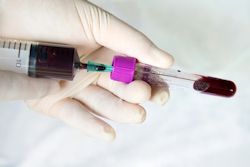Unsafe Activities in the Laboratory
Employees working in laboratories should not:
- perform mouth pipetting/suctioning of blood or OPIM;
- Eat, drink, smoke, apply cosmetics or lip balm, or handle contact lenses in work areas where there is a reasonable likelihood of exposure to blood or OPIM; and
- Store food or drink in refrigerators, freezers, shelves, cabinets or on countertops or benchtops where blood or OPIM are present.
Protective Measures
Employers must provide employees with the following protective measures:
- Appropriate PPE for workers if blood or OPIM exposure is anticipated.
- Gloves must be worn when hand contact with blood, mucous membranes, OPIM, or non-intact skin is anticipated, or when handling contaminated items or surfaces.
- Surgical caps or hoods and/or shoe covers or boots must be worn in instances when gross contamination can reasonably be anticipated such as during autopsies or orthopedic surgery.
- Effective engineering and work practice controls to help remove or isolate exposures to blood and bloodborne pathogens.
- Hepatitis B vaccination (if not declined by a worker) under the supervision of a physician or other licensed healthcare professional to all workers who have occupational exposure to blood or OPIM.

Gloves must be worn when hand contact with blood, mucous membranes, OPIM, or non-intact skin is anticipated.
Knowledge Check Choose the best answer for the question.
6-3. Which vaccination must employers offer to employees who have occupational exposure to human blood or OPIM?
You forgot to answer the question!
